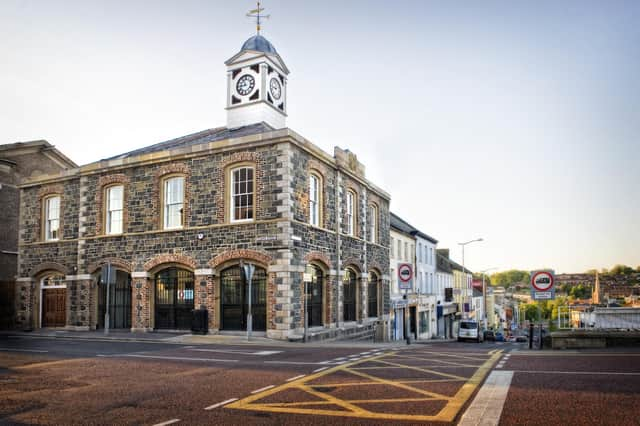Rowdy meeting on emigration is held in Banbridge Town Hall (1852)


George Tyrrell, Esq, coroner for the county, occupied the chair.
The large room was crowded to excess, with many being unable to gain admittance.
Advertisement
Hide AdAdvertisement
Hide AdMr King delivered “a most interesting address”, which occupied about an hour and a half. He was loudly applauded throughout.
William Black, Esq, JP, proposed, and the Reverend R Anderson seconded, a vote of thanks to Mr King, “which was carried by acclamation”.
At this stage of the proceedings, the Reverend Mr Rutherford, of “shilling-an-acre” notoriety got up and put a question to Mr King, which that gentleman answered very satisfactorily.
The Reverend Rutherford “commenced a most rambling speech”, and was allowed to fro on for a length of time, when he was interrupted by the chairman, and told “to confine himself to the subject they had met there to discuss, and not continue to make statements which were altogether foreign to the subject”. A scene of the greatest confusion ensued.
Advertisement
Hide AdAdvertisement
Hide AdThe News Letter reported: “A few of the rabble who attended the meeting to support Mr Rutherford, and to whom he promised that he would turn the assembly into ‘a tenant right meeting’, kept up halloing for a considerable time, and if it had not been for the dignity and firmness displayed by the chairman, there was every probability of a breach of the peace.
“The orator then began to his harangue in a style something similar to what you would expect from one of the Young Ireland party in their palmiest days, the whole ‘gist’ of it being that, if they would emigrate at all, ‘to go to a free soil, where they would be rid of British rule, and be no longer kept in a state of slavery and bondage’.”
He concluded by proposing a resolution (“the purport of which, from the mat noise, I could not hear,” wrote the News Letter correspondent), and which was seconded by his brother Aaron.
Mr King got up to reply, but Mr Rutherford would not allow him to proceed, insisting that his resolution should be put to the meeting.
Advertisement
Hide AdAdvertisement
Hide AdWhen Mr King was allowed to proceed he confined himself to refuting the absurd statements which Mr Rutherford had made “in depreciation of the colony of Victoria”.
Reflecting on the evening’s proceedings and the behaviour of the Reverend Rutherford and his “rabble”, the News Letter’s correspondent from Banbridge wrote: “The people of this place feel most indignant at the conduct of the Rutherford party, and are greatly annoyed at the idea it must convey to the minds of respectable parties, who had come there from a distance, of the character of Banbridge.
“That any party could have shown such very bad taste as to receive, in such a manner, a gentleman who had just returned to his native land, after such a lengthened absence, standing within a few miles of his birthplace, and who had come there that night to offer a boon to his fellow countrymen, was, at least, a very great breach of courtesy and good manners, to say nothing of the sentiment which prompted the opposition.”
Mr King’s return to Ireland also drew comment from the News Letter later that week.
Advertisement
Hide AdAdvertisement
Hide AdAn editorial read: “Mr J C King, Esq, is at present (Monday) stopping at his native place, Dromara, County Down, where be is cordially welcomed by his old friends and acquaintances, by whom he was much esteemed. A good many of the labouring classes intend to go to Victoria, if they can possibly get away. Many have large families. A good many of them have been applying, but some of them do not like the idea of leaving the home of their fathers, perhaps for ever, and would rather live upon half diet in Ireland than go, if they could possibly avoid it.”
Comment Guidelines
National World encourages reader discussion on our stories. User feedback, insights and back-and-forth exchanges add a rich layer of context to reporting. Please review our Community Guidelines before commenting.